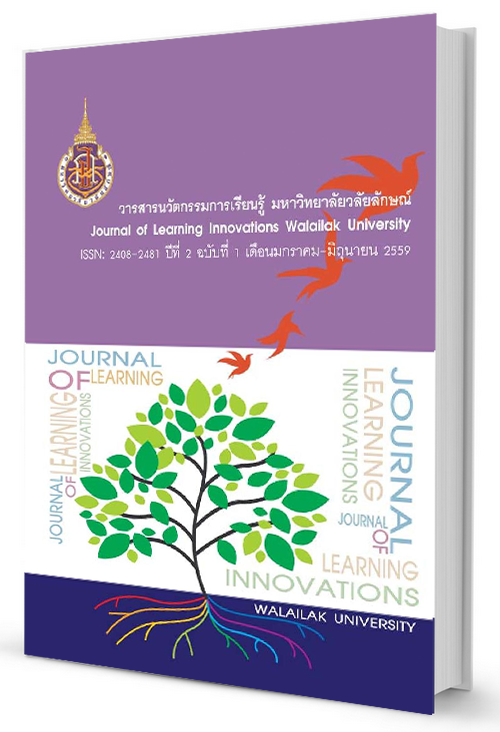Pre-service Biology Teachers’ Understandings aboutNature of Scientific Inquiry
DOI:
https://doi.org/10.14456/jli.2016.7Keywords:
ธรรมชาติของวิทยาศาสตร์, การสืบเสาะทางวิทยาศาสตร์, นิสิตครู, วิทยาศาสตร์, Nature of Science, Scientific Inquiry, Pre-service Science TeachersAbstract
This research aimed at studying 30 pre-service biology teachers’ understandings about nature of scientific inquiry. The researchers collected data using a questionnaire and analyzed the data through interpreting and inductively categorizing the answers. The research results showed that most of the students did not understand some aspects of nature of scientific inquiry (e.g., various ways to do scientific inquiry, necessity of questions in doing scientific inquiry, and the difference between data and evidence). However, they understood some aspects of nature of scientific inquiry (e.g. subjectivity inherently embedded in scientific inquiry and the use of evidence and knowledge in constructing scientific explanations). This research gives suggestions about facilitating the pre-service teachers to understand nature of scientific inquiry, which is necessary for them to implement scientific inquiry-based instruction during practicum.
References
จุฬารัตน์ เลี้ยงไกรลาศ และ นฤมล ยุตาคม. (2553). กรณีศึกษา: การรับรู้เกี่ยวกับ การจัดการเรียนการสอนแบบสืบเสาะและการปฏิบัติการสอนของครูชีววิทยา. วารสารมนุษยศาสตร์และสังคมศาสตร์มหาวิทยาลัยมหาสารคาม, 29(4),23 - 37.
ธิติยา บงกชเพชร และ วรรณทิพา รอดแรงค้า. (2553). ความรู้/ความเชื่อเกี่ยวกับ การสอนดาราศาสตร์ที่เน้นกระบวนการสืบเสาะหาความรู้ของครูวิทยาศาสตร์ ในระดับชั้นประถมศึกษาปีที่ 6. วารสารมนุษยศาสตร์และสังคมศาสตร์ มหาวิทยาลัยมหาสารคาม, 29(3), 85 - 97.
พงศ์ประพันธ์ พงษโสภณ. (2552). สอนวิทยาศาสตร์อย่างที่วิทยาศาสตร์เปีน. วารสารวิทยาศาสตร์, 63(1), 84 - 89.
ลฎาภา สูทธถูล, นฤมล ยุตาคม, และ บุญเกื้อ วัชรเสถียร. (2554). กรณีศึกษา ความเข้าใจธรรมชาติของวิทยาสาสตร์และการปฏิบัติการสอนของครูระดับประถมศึกษา. วิทยาสารเกษตรศาสตร์ (สาขาสังคมศาสตร์), 32(3), 458 - 469.
ลือซา ลดาซาติ. (2558). การวิจัยเชิงคุณภาพสำหรับครูวิทยาศาสตร์. กรุงเทพฯ: สำนักพิมพ์แห่งจุฬาลงกรณ์มหาวิทยาลัย.
ลือซา ลดาซาติ และ ลฎาภา สุทธกูล. (2555). การสำรวจและพัฒนาความเข้าใจ ธรรมซาติของวิทยาศาสตร์ของนักเรียนซั้นมัธยมศึกษาปีที, 4. วารสาร มหาวิทยาลัยนราริวาสราชนครินทร์, 4(2), 73 - 90.
ลือชา ลดาชาติ, ลฎาภา สุทธกูล, และ ชาตรี ฝ่ายคำตา. (2556). ความแตกต่างที่สำคัญระหว่างการส่งเสริมการเรียนการสอน "ธรรมซาติของวิทยาศาสตร์" ภายนอกและภายในประเทศไทย. วิทยาสารเกษตรศาสตร์(สาขาสังคมศาสตร์), 34(2), 269 - 282.
สำนักวิซาการและมาตรฐานการศึกษา. 2553. ตัวชี้วัดและสาระการเรียนรู้แกนกลาง กลุ่มสาระการเรียนPทยาศาสตร์ ตามหลักสูตรแกนกลางการศึกษาขั้นพื้นฐาน พุทธศักราช 2551. กรุงเทพฯ: โรงพิมพ์ชุมนุมสหกรณ์การเกษตรแห่ง ประเทศไทย จำกัด.
สุทธิดา จำรัส และ นฤมล ยุตาคม. (2551). ความเข้าใจและการสอนธรรมซาติของ วิทยาศาสตร์ในเรืองโครงสร้างอะตอมของครูผู้สอนวิชาเคมี. วิทยาสาร เกษตรศาสตร์ (สาขาสังคมศาสตร์), 29(3), 228 - 239.
สุทธิดา จำรัส, นฤมล ยุตาคม, และ พรทิพย์ ไชยโส. (2552). ความเข้าใจธรรมชาติ ของวิทยาศาสตร์ของนักเรียนแผนการเรียนวิทยาศาสตร์ขั้นมัธยมศึกษา ปีที่ 4. วารสารวิจัย มข., 14(4), 360 - 374.
Abd-El-Khalick, F. and Lederman, N. G. (2000). Improving Science Teachers’ Conceptions of Nature of Science: A Critical Review of the Literature. International Journal of Science Education, 22(7), 665 - 701.
Akerson, V. L., Abd-El-Khalick, F., and Lederman, N. G. (2000). Influence of a Reflective Explicit Activity-Based Approach on Elementary Teachers’ Conceptions of Nature of Science. Journal of Research in Science Teaching, 37(4), 295 - 317.
Bybee, R. W., Taylor, J. A., Gardner, A., Scotter, p. V., Powell, J. c., Westbrook, A., and Landes, N. (2006). The BSCS 5E Instructional Model: Origins, Effectiveness, and Applicotions. Retrieved from
https://bscs.org/sites/default/files/_legacy/BSCS_5E_lnstructional_ Model-Executive_Summary_0.pdf (4 April 2014)
Fives, H., Huebner, พ., Birnbaum, A. ร., and Nicolich, M. (2014). Developing a Measure of Scientific Literacy for Middle School Students. Science Education, 98(4), 549 - 580.
Gray, R. (2014). The Distinction between Experimental and Historical Sciences as a Grameworkfor Improving Classroom Inquiry. Science Education, 98(2), 327 - 341.
Hodson, D. (1998). Toward a Philosophically More Valid Science Curriculum. Science Education, 72(1), 19 - 40.
Khishfe, R., and Abd-El-Khalick, F. (2002). Influence of Explicit and Reflective Versus Implicit Inquiry-Oriented Instruction on Sixth Graders’ Views of Nature of Science. Journal of Research in Science Teaching, 39(7), 551 - 578.
Lederman, J. ร., Lederman, N. G., Bartos, ร. A., Bartels, ร. L., Meyer, A. A., and Schwartz, R. ร. (2014). Meaningful Assessment of Learners’ Understandings about Scientific Inquiry—The Views about Scientific Inquiry (VASI) Questionnaire. Journal of Research in Science Teaching, 51(1), 65 - 83.
National Research Council [NRC], 1996. The Notional Science Education Standards. Washington D.C.: National Academy Press.
Yuenyong, c. and Narjaikaew, p. (2009). Scientific Literacy and Thailand Science Education. Internotionol Journal of Environmental and Science Education, 4(3), 335 - 349.
Downloads
How to Cite
Issue
Section
License
เนื้อหาและข้อมูลในบทความที่ลงตีพิมพ์ในวารสารนวัตกรรมการเรียนรู้ มหาวิทยาลัยวลัยลักษณ์ ถือเป็นข้อคิดเห็นและความรับผิดชอบของผู้เขียนบทความโดยตรง ซึ่งกองบรรณาธิการวารสาร ไม่จำเป็นต้องเห็นด้วย หรือร่วมรับผิดชอบใดๆ
บทความ ข้อมูล เนื้อหา รูปภาพ ฯลฯ ที่ได้รับการตีพิมพ์ในวารสารนวัตกรรมการเรียนรู้ มหาวิทยาลัยวลัยลักษณ์ ถือเป็นลิขสิทธิ์ของวารสารนวัตกรรมการเรียนรุ้ มหาวิทยาลัยวลัยลักษณ์ หากบุคคลหรือหน่วยงานใดต้องการนำทั้งหมดหรือส่วนหนึ่งส่วนใดไปเผยแพร่ต่อเพื่อกระทำการใดๆ จ้อต้องได้รับอนุญาตเป็นลายลักษณ์อักษรจากวารสารนวัตกรรมการเรียนรู้ มหาวิทยาลัยวลัยลักษณ์ก่อนเท่านั้น

